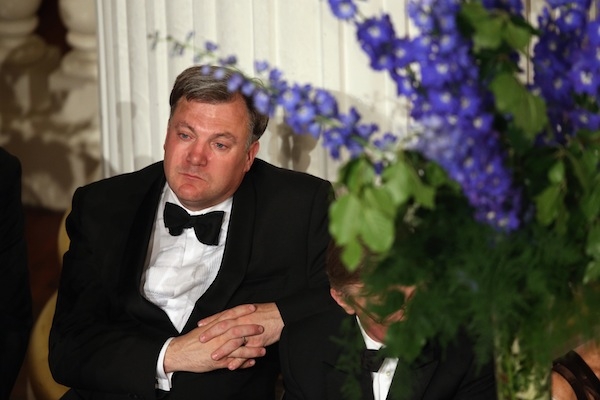Strangely, both sides at Treasury questions today wanted to talk about something that does their own party no favours at all to mention. The Labour whips had sent their loyal backbenchers out in force to ask about Friday’s borrowing figures, while George Osborne and Conservative colleagues were very happy indeed to talk about how much the Opposition would have to borrow, too.
Labour wanted to tell off the government for borrowing more. The government wanted to remind Labour that it would borrow even more.
When it comes to performing elaborate and quite painful-looking contortions, Ed Balls is a master, but even he must realise that telling off another party for borrowing quite a bit when your own plans would have you borrowing even more, while trying to make an argument for ‘good borrowing’ for capital projects vs ‘bad borrowing’ for day-to-day spending, is really very difficult to pull off. You can barely fit the thing in a sentence, let alone a coherent political strategy.
Nevertheless, he clearly thought it was worth a shot, telling the Chamber:
‘The reason is, for all the Budget speech bluster, borrowing last year didn’t go down, it went up, Mr Speaker. Let me ask him another question. Bonuses paid in the financial services sector this April, the first month of the new tax year, were 65 per cent higher than the same month last year, up by a total in that month of £1.3 billion. Can the Chancellor tell the House why did bank bonuses rise by £1.3 billion this April?’
Osborne replied:
‘First of all, on borrowing, that government was borrowing £157 billion a year. This government borrowed £118 billion last year. That is a fall in borrowing, the deficit is down by a third and that’s because we’re taking the tough decisions to make sure that Britain lives within its means.’
Balls snapped back that Osborne was ‘unfair, out-of-touch and now revealed as totally incompetent’, which must have come as a relief to those watching who were worried he wouldn’t get a chance to slot those words in somewhere. Osborne told the Shadow Chancellor that a lesson from him ‘in how to balance the books is like getting a lesson from Dracula on how to look after a blood bank’. He added:
‘It really is a most extraordinary situation he finds himself in. On Saturday, the Labour leader said Labour is going to rule out borrowing more. On Sunday the Shadow Chancellor when asked could Labour borrow more, he said yes, yes, of course! And then on Monday they committed to higher welfare spending. It is a complete shambles and they find themselves on the eve of this spending review in the extraordinary situation where they have completely abandoned the economic argument that they’ve been making for the last three years, but they’ve kept the disastrous economic policy. It is a hopeless position, the Shadow Chancellor has led them up a cul-de-sac and they’ve got to find their way out of it.’
When other Labour MPs tried to raise this, they were politely reminded by Greg Clark of the number of times they have opposed government cuts in the Chamber, in an attempt to underline Labour’s reluctance to make tough decisions. And George Osborne repeated his line that while Labour borrowed £157 billion a year, the Coalition is borrowing £118 billion. Which is in one way effective as it does suggest that things are improving, but simply reading those numbers out again and again in the Chamber reminds those listening of quite how much is still being borrowed every year. It’s a shocking figure and hardly suggests control and discipline on the Chancellor’s part.
The Tories just about edged this session, partly because they effectively portrayed Labour as performing fiscal gymnastics, but also because they did offer a few good answers to the most sensible Labour question, which came from Alison McGovern. She asked whether, in spite of more money in their pockets from rises in the personal tax allowance, her constituents would really feel that their lives were improving given rising food prices. Other Conservative MPs asked questions that gave the ministers on the frontbench the opportunity to highlight the government’s efforts on fuel duty and other pressures as evidence that it is trying to deal with the cost of living.
It is that question from McGovern, an adaptation of the Reagan ‘are you better off now’ question that will in 2015 read ‘do you really feel better off than you were in 2010’, that will influence voters more than scary figures on debt from both parties. If they don’t both want to scare voters off, then perhaps focusing planted questions on the cost of living would benefit both sides rather than the current strategy of highlighting their own problems as they attempt to attack their opponents.







Comments